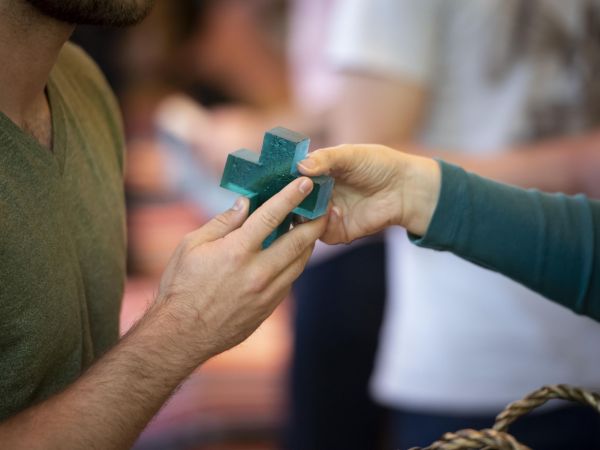For students called to integrate faith with professional expertise, Duke Divinity School offer interdisciplinary dual degree programs that enable students to pair theological education with another graduate degree, fostering an environment where academic rigor, practical application, and spiritual growth intersect.
By partnering with Duke’s renowned schools—including Law, Public Policy, Medicine, and others—dual degree students are equipped to tackle multifaceted and pressing challenges in today’s world. Through interdisciplinary coursework and impactful collaborations, these programs empower students to lead with purpose and innovation.
Below, students and alumni reflect on how their programs fostered personal growth, broadened their vocational horizons, and prepared them to make a meaningful impact.
Desiree Lucas: Master of Divinity and Master of Social Work (M.Div./M.S.W. ‘26)
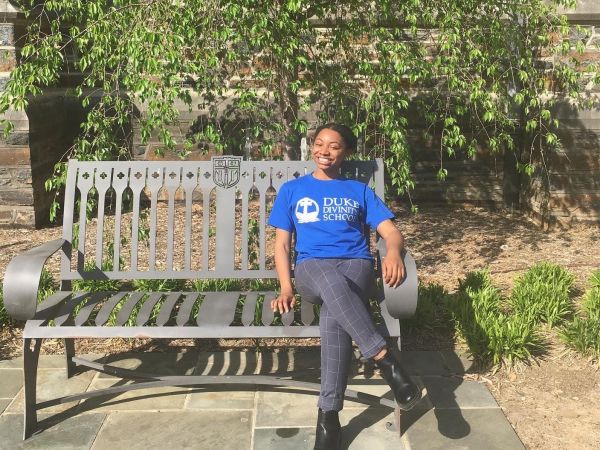
Desiree Lucas, who is pursuing an M.Div. and M.S.W., discerned a call to ministry through campus ministry at UNC Chapel Hill and a pivotal summer in Birmingham, Ala. working with local UMC churches and organizations addressing poverty and food insecurity.
These experiences solidified her passion for community engagement.
“I envision myself in community organization spaces,” she says. Recognizing the synergy between social work and theological education, she pursued the dual degree program to integrate these disciplines. This unique program combines an M.Div. earned at Duke Divinity School with an M.S.W. earned at the University of North Carolina at Chapel Hill.
As she discerns her vocational path, Lucas hopes to contribute to both the local church and community development organizations, leveraging her interdisciplinary training.
She encourages other prospective students interested in this dual degree to delve into their interdisciplinary interests early, saying, “Explore relevant coursework in both disciplines to get a glimpse of what the experience could be like.” Lucas’s own experiences and mentors during her undergraduate degree highlighted her passion for collaboration, which is a value she carries with her into her studies, work, and relationships.
At Duke, Lucas values the relationships she has formed with professors, staff, and peers. “These connections have been incredibly supportive of both my academic and personal life,” she says. The dual degree program has given her a chance to form connections across fields, leading to a truly life-changing community at Duke.
Madison Daniel II: Master of Divinity and Master of Public Policy (M.Div./M.P.P. ‘25)
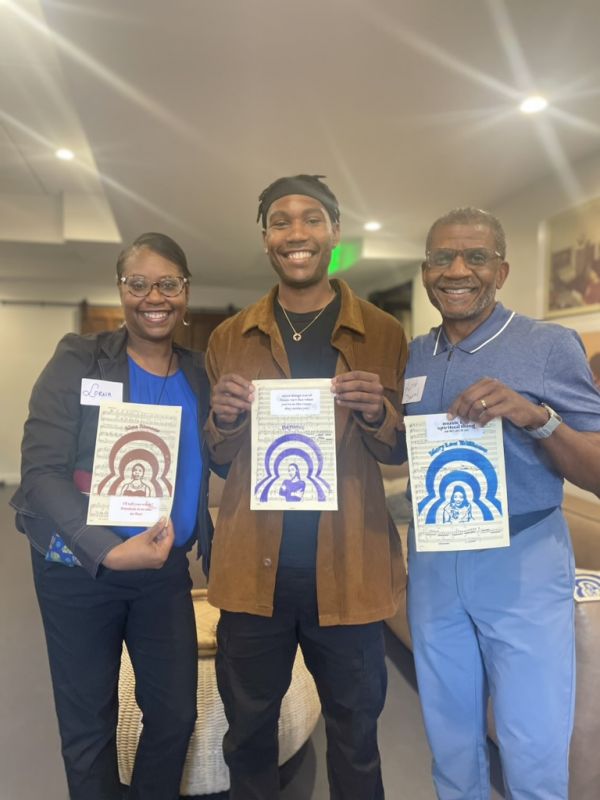
While earning his M.Div./M.P.P., Madison Daniel II has exemplified the integration of faith and social engagement. His journey to Duke was shaped by his deep ties to his hometown of Durham, N.C., and his commitment to community service.
During his time at Furman University earning a bachelor’s degree in public health, Daniel worked in nonprofits supporting individuals experiencing poverty and helping with foster care services. The combination of his degree work and community work sparked an interest in holistic health, spurring a desire to deepen his understanding of how theology integrates with social determinants of health and well-being.
Reflecting on his decision to pursue a dual degree, Daniel explains, “Public policy allows me to engage with community life while addressing real issues that affect how people live. Choosing to pursue a dual degree has helped me articulate my ethics with openness and humility. I am particularly interested in public theology as it relates to serving alongside those with different beliefs.”
Daniel’s interdisciplinary studies have enriched his perspective, particularly through experiences like a class at Butner Federal Prison, where he engaged in meaningful dialogue with both Duke peers and incarcerated individuals. “This experience reinforced my belief in the expansiveness of humanity and the importance of education that bridges divides,” he says.
His vocational hopes include working at the intersection of social policy, community development, and justice. He wants to support under-resourced communities by addressing barriers to opportunity. Says Daniel, “I hope to contribute to creating spaces where individuals and communities can thrive by advocating for policies that uplift human dignity. I want to continue exploring how faith communities can play a role in advancing community well-being, fostering collaboration between religious institutions and broader societal efforts.”
"Public policy allows me to engage with community life while addressing real issues that affect how people live. Choosing to pursue a dual degree has helped me articulate my ethics with openness and humility."
Nicole Ma: Master of Theological Studies and Master of Public Policy (M.T.S./M.P.P., '26)
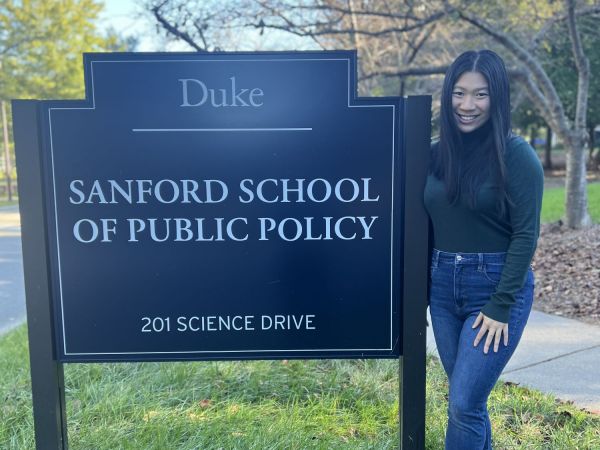
Nicole Ma’s path to the dual degree program—pursuing an M.T.S. and an M.P.P.—is rooted in her commitment to advocacy.
As an undergraduate at Baylor University, she discovered a passion for addressing systemic inequities, fighting for the underserved, and creating space where none existed for the Asian American community.
After graduating, Ma began work at a non-profit in Houston called Woori Juntos, meaning “us together, rising” in Korean and Spanish. The organization channels her passion for bridging historically disparate groups toward a shared vision of justice, inspiring her to combine theological and policy studies. “My faith is my ‘why,’ and policy is my ‘how,’” Ma explains.
Ma shared how inspired she has been by the hard work of her immigrant parents. From their unconditional love to their tireless work to provide for their family, her parents have given her so much. “Grateful and lucky are understatements to describe the love my family offers me; it’s the closest thing to Christ’s unconditional love that I will obtain on this earth. I owe my community, family, and neighbors a better future,” she says.
Her life and education have driven her to advocate for Asian Americans and other overlooked populations in both theological and policy spaces. “Just because this is how the world has continuously operated, it does not mean it is how it should be,” says Ma. “I believe and want to strive for the world God intended with the flourishing of all.”
Ma’s vocational aspirations include reforming oppressive systems and advancing human rights through the intersection of theology, ethics, and public policy. Her advice to prospective students? “Define your own race. Advocate for yourself and your passions. When God calls, you respond.”
Caleb Strawn: Juris Doctor and Master of Theological Studies (J.D./M.T.S., ‘23)
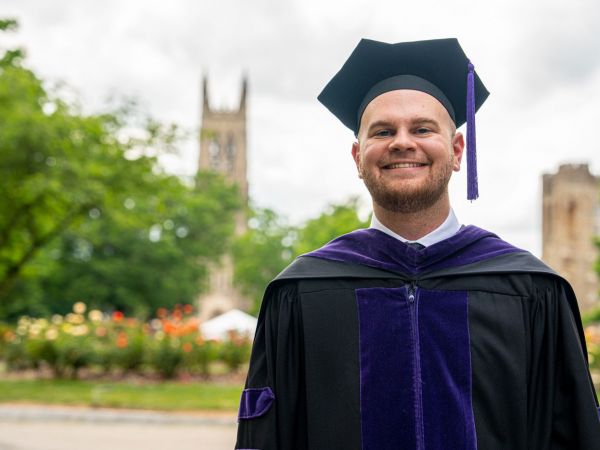
For alumnus Caleb Strawn, M.T.S. and J.D. ’23, the dual degree program at Duke was an opportunity to integrate his aspirations of becoming an attorney with his calling to ministry.
Strawn now practices as a commercial real estate attorney in Charlotte, N.C., while maintaining an active role in his local church.
“I picked Duke because it was one of the few places that could train me as both an aspiring church leader and an attorney,” Strawn says. Despite going into law work full-time, he feels that he gained invaluable skills from his time in Divinity School. “I know God better and more fully after my time at Duke, and I now feel better equipped to make a ministerial impact in my day-to-day context,” he says.
The program equipped him with a Christian imagination and understanding of vocation that informs his legal practice. “My theological education shapes the posture in which I serve my colleagues and clients. My theological education directly impacts my spiritual formation and my involvement in pro bono projects,” he explains.
Lastly, Strawn emphasizes the enduring value of Duke’s community, noting how relationships with peers and professors have profoundly influenced his journey. “Duke’s best asset is its people,” he says. “Duke Divinity’s small, cohesive community makes the relationships students create with each other one of the most memorable parts of the program.”
“I picked Duke because it was one of the few places that could train me as both an aspiring church leader and an attorney. I know God better and more fully after my time at Duke, and I now feel better equipped to make a ministerial impact in my day-to-day context."
Monica Bodd: Doctor of Medicine and Master of Theological Studies (M.D. ‘23/M.T.S. ‘22)

Monica Bodd, M.T.S. ’22, M.D. ’23, didn’t come to Duke planning to pursue the M.T.S. alongside her medical degree, but she found herself choosing the program after finding that medical school raised questions that she wanted to explore.
“I’ve always been drawn to the human and lived experience of patients,” she says.
Coming from an anthropology and social science background, Monica found the dual degree program to be a reprieve from the rigidity of medical school and an avenue to address profound questions about suffering.
Today, Bodd is a head and neck surgery resident physician at Stanford in Palo Alto, Calif. Her decision to pursue the M.D. and the M.T.S. (available as an official dual degree program since 2023) was catalyzed by her encounters with patients facing end-of-life care. “I had a young patient who passed away, and I would sit with him toward the end of his life and pray for him. When he died, I remember feeling so frustrated and overwhelmed,” she says. These experiences, along with questions from patients and friends about faith and suffering, led Bodd to seek a theological framework for understanding and supporting others.
At Duke, Bodd appreciated the flexibility of the Divinity School program, which allowed her to align her theological studies with her surgical interests. She collaborated with both the Divinity School and the Department of Head and Neck Surgery on her thesis, “A Theology of Facial Disfigurement,” conducting ethnographic work in clinical settings. “Everything came together for that thesis,” she says.
Bodd continues to find value in her dual degree in her current profession. “Where it comes into play the most is when I see a really hard thing at work, I tap into some of those conversations I had or things I learned and read in Divinity School,” she says. These moments remind her of the meaningful connections and mentorships she built during her time at Duke, which she still relies on when facing challenges in her career.
Reflecting on her theological education, she says, “People in the medical field often ask why I would go to seminary, and the answer I always give them is that I went to Divinity School to figure out why people suffer. To figure out those questions and get some answers, but I left Divinity School with even more questions than I ever had before.”
She adds: “Sometimes just sitting with people is enough. I don’t rush to provide patients with answers about suffering but rather sit with them and acknowledge how hard it is what they are going through.”
A Commitment to Interdisciplinary Excellence
Duke Divinity School’s dual degree programs exemplify the university’s commitment to interdisciplinary excellence. By connecting theological education with fields like public policy, social work, medicine, and law, the program equips students to address complex challenges with creativity and compassion. Whether pursuing innovative academic pathways, advocating for marginalized populations, or bridging divides in secular professions, Duke’s dual degree students and alumni embody a commitment to faith-informed leadership and a passion for shaping a more just and compassionate world.

